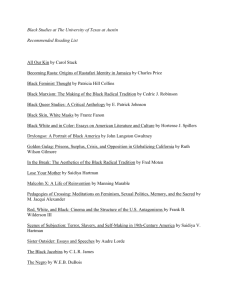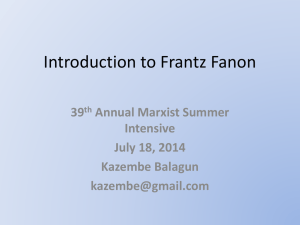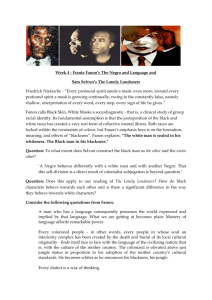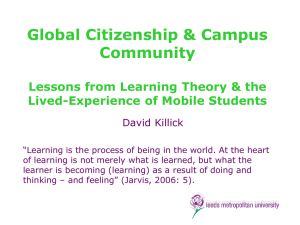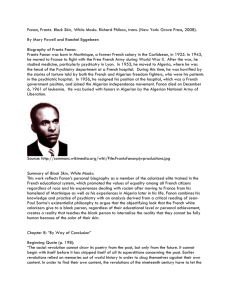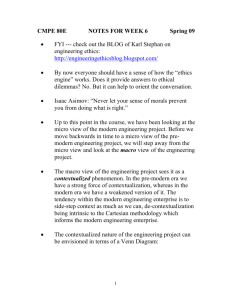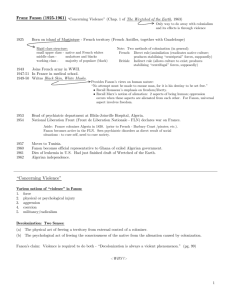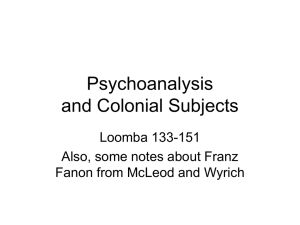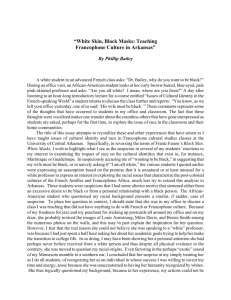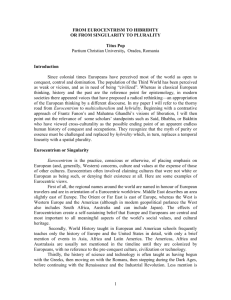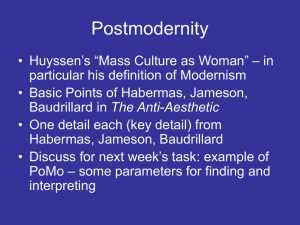21 Fanon Patterson Habermas SP 2012
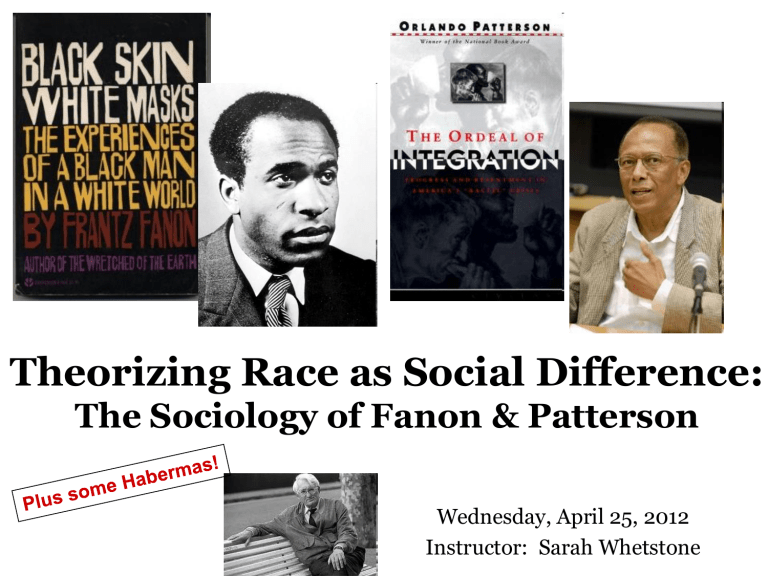
Theorizing Race as Social Difference:
The Sociology of Fanon & Patterson
Wednesday, April 25, 2012
Instructor: Sarah Whetstone
*Optional study session!*
Monday, April 30 th , 4:00 - 5:00 pm,
1-103 Hanson Hall
Readings and Key Concepts
• Fanon
– Black skin, white masks
– Two frames of reference
– “Being Black for the white man”
• Patterson
– The “paradoxes”
• Anti-racist racism
• One-drop rule
• Liberal racialization in public discourse
• Habermas
– Definition of the situation, communication
– Lifeworld, meaning and components
– Rationalization of lifeworld
– Habermas’ “utopian” vision for public democracy
• Psychiatrist
• Philosopher
• Revolutionary
• Sociologist
Frantz Fanon
• Born in the French colony of
Martinique
• Psychology of Colonization,
Oppression, Racism
Frantz Fanon
(1925-1961)
• Black Skin, White Masks (1952)
– an analysis of the psychological effects of colonial subjugation on people identified as Black.
– Fanon’s reflections on his experiences as a Black professional in West Indies
• One of the most influential Caribbean born theorists and revolutionary activists
• Anti-colonialism, anti-racism
Black skin, white masks …
Why does language matter so much for Fanon?
… “to speak is to exist absolutely for the other….. To speak means above all… to assume a culture, to support the weight of a civilization…
… “The Negro… will be proportionately whiter– that is, he will come closer to being a real human being– in direct ratio to his mastery of the
French [white man’s] language… He becomes whiter as he renounces his blackness” (337-8).
Two frames of reference…
“For not only must the black man be black– he must be black in relation to the white man… Over night the
Negro has been given two
frames of reference within which he has had to place himself. His… customs… were wiped out because they were in conflict with a civilization that he did not know and that imposed itself on him” (339).
Fanon-inspired art!
“Being Black for the white man…”
“Man is human to the extent to which he tries to impose his existence on another man in order to be recognized by him… It is in recognition by that other being, that his own human worth and reality depend” (342).
In colonization, there is no recognition. The colonized are
“invisible” to their colonizers. Fanon argues that Blacks must struggle, must fight to make themselves recognizable.
“For the French Negro the situation is unbearable. Unable ever to be sure whether the white man considers him consciousness in-itself-for-itself, he must forever absorb himself in uncovering resistance, opposition, challenge” (344).
Group Work Part I/II
1. What sort of struggle is
Fanon advocating for Black identity (343)? Refer to specific quotes.
2. Explain Fanon’s racialized critique of the values of
equality and liberty (344).
3. Compare Fanon’s theories to other scholars of difference we’ve discussed-
- Du Bois, D. Smith, or
Collins. Can you point to any similarities and/or differences?
Orlando Patterson
• Born in the West Indies
• Widely read historical and cultural sociologist
• Ph.D. in Sociology at the London
School of Economics in 1965
• Currently holds the John Cowles chair in Sociology at Harvard
University.
Orlando Patterson
(b. 1940)
• Work shows how the notion of
“freedom” in a discourse on human rights reflects the racist roots in the opposition of slave/freeman.
Group Work Part II/II
• What are the “paradoxes of integration”
Patterson points to? Summarize and find a quote that typifies each of the “paradoxes”:
– Paradox of “anti-racist racism”
– Paradox of the “one drop rule”
– Paradox of “liberal racialization”
• Compare Fanon and Patterson– How do they each approach the issue of racial difference in unique ways?
Paradoxes of Integration
“…The moral embrace of integration is a liberation with a doubletake of outrage verging on incomprehension”
(348).
1.
Anti-racist racism-
Embracing race to challenge race risks reifying race as a category.
2.
One-drop rule-
What is it? Why are some African Americans defending it?
3.
Liberal racialization in academic and public discourse-
Distinctions between race and ethnicity is an “essential part of
American racist ideology” (352).
Habermas…
• Influenced by, but divided with, the
Frankfurt School of critical theory
– Believed in the use of reason and communication in the public sphere as a means for democratic change
– “Mixed bag” view of modernity, similar to
Giddens’ “in-between” view
• Work inspires democratic activists who seek to increase the scope and power of the public sphere
Communication and the Lifeworld
• All speech acts have the goal of mutual understanding
• Through communication, we agree on a “definition of the situation”– that is, together, we agree on our social reality (372).
• The “lifeworld” is the basis for social life-- shared understandings. These can be normative, subjective, objective… (371-372).
Lifeworld
• A network of shared meanings, or background assumptions, that individuals draw on to construct identities, to negotiate situational definitions, or to create social solidarity.
• The taken-for-granted “cultural know-how” through which we construct common understandings of our social world.
• In many ways, a student of Marx, but Habermas moves away from a focus on material conditions to look at how symbolic forms of
communication reproduce social reality.
Components of the Lifeworld…
Berger &
Luckmann’s social construction of reality personality culture
Habermas’
“lifeworld” encompasses all three domains.
society
Mead’s social psychology
Durkheim’s social order
Rationalization of the Lifeworld
The lifeworld personality culture society
Economic and administrative systems
Habermas’ Theory of Social Evolution:
Systems are colonizing the lifeworld!
Rationalization —
A familiar theme!
Beginning with
Weber… Critical theorists… Giddens…
DiMaggio & Powell… etc…
“Civil Society and the Political Public
Sphere”
• Habermas had mixed views on modernity
– Saw the problem of rationalization
– Believed reason based on communicative action could provide means for establishing economic equality, democracy, and liberation from oppression
– Hopes the power of reason will combat the dehumanizing consequences of rationalization
• It is not material reproduction (Marx), but
symbolic reproduction that is the greatest threat to freedom and progress in modernity.
• “Ideal speech situation” is utopian ideal.
